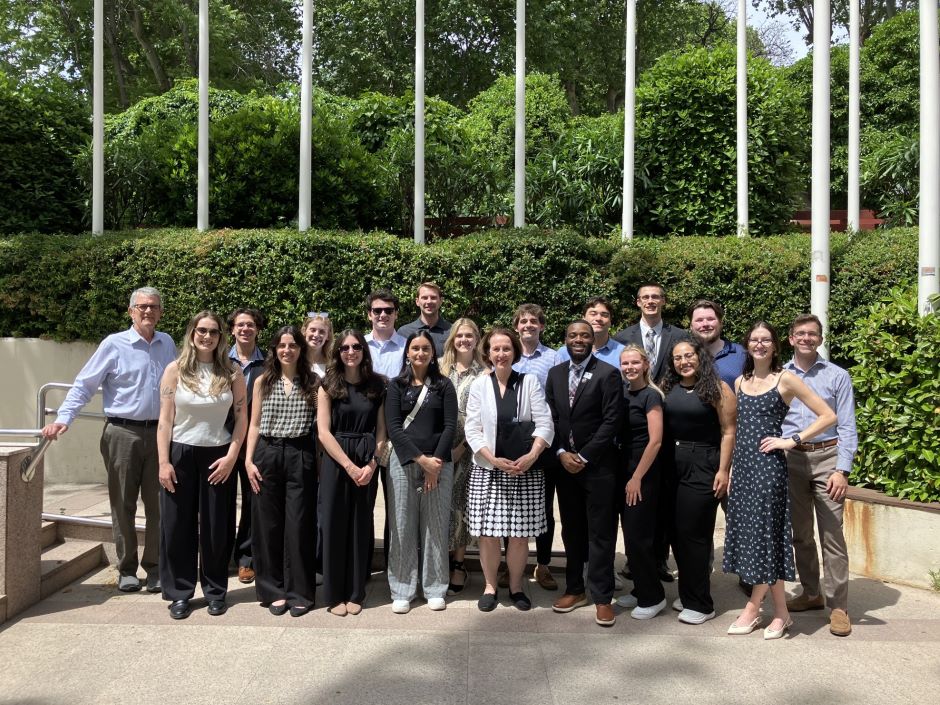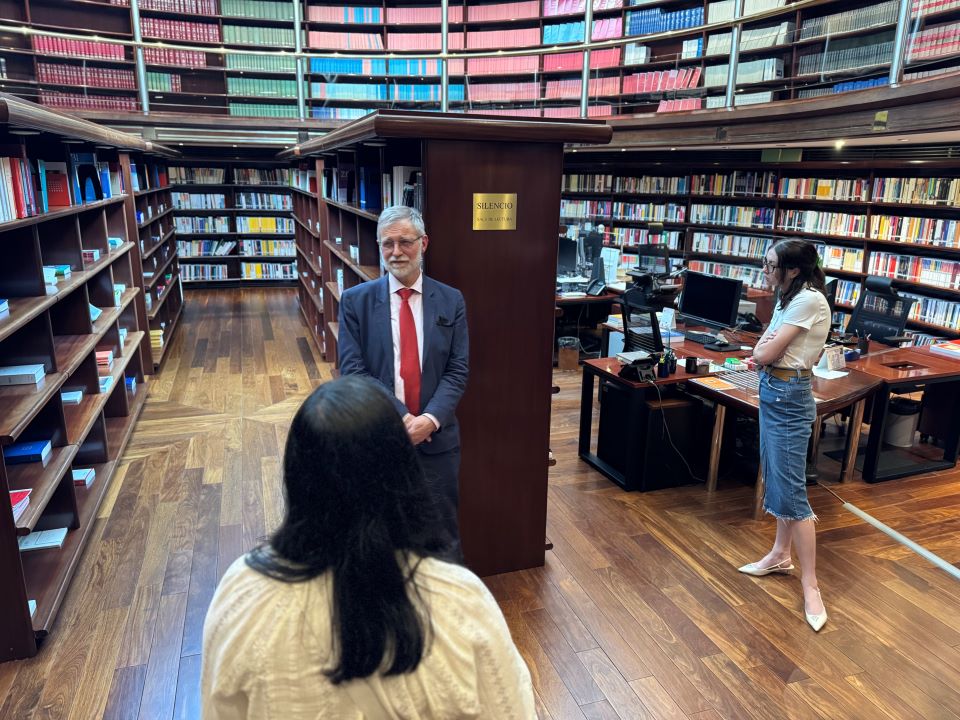Chronicles from the Summer Law Program in Madrid
The Saint Louis University School of Law Center for International and Comparative Law organizes the ABA-approved Summer Law Program at SLU-Madrid. Every summer law students from SLU LAW along with a number of students from law schools across the country, head to SLU-Madrid for a six-week program taking international law and comparative law classes and exploring all Madrid has to offer. .
In addition to their coursework, students learn about Madrid's cultural and legal institutions. Students participating in the program share their experiences with the different visits and experiences.
Walking Tour
By Eli Brenner
Our walking tour of Madrid began with Professor Lasarte at a Starbucks in Plaza de España, where we kicked things off at the Monumento a Cervantes. It was a warm, sunny afternoon — 32°C — and the surrounding gardens were full of life as locals soaked in the spring weather.
We made our way to a viewpoint over the Jardines de Sabatini, once the site of royal stables, and continued through nearby plazas and gardens adorned with statues of Spanish monarchs originally meant for the Royal Palace roof. As we moved toward the Plaza de la Armería, we learned about the old city walls — now mostly gone — and how their purpose faded after the Reconquista.
One of the highlights was visiting the Catedral de la Almudena, built on the foundations of an old mosque. We also saw the last remnants of Madrid’s walls in Parque del Emir Mohamed I and heard the legend of the image of Santa María de la Almudena.
The final leg of the tour took us past the Monument to Victoria Eugenia and Alfonso XIII, whose assassination attempt foreshadowed the fall of the monarchy. We continued through the winding streets to Plaza de la Villa, Casa de Cisneros, Mercado de San Miguel, Plaza Mayor, and finally Puerta del Sol. Along the way, we picked up tips for avoiding tourist traps and learned how not to stand out as “giddies” — the local slang for tourists. It was a great introduction to Madrid’s deep history and vibrant culture.
European Union Commission Visit
By Justin Fuller

On May 26, students from our law and MBA programs in Madrid had the unique opportunity to visit the Spanish Representative Office of the European Commission for an in-depth session on EU law, policy, and global trade.
We were honored to be welcomed by Beatriz Alvargonzález Largo, economic counselor, who provided a compelling overview of the European Union’s history, institutional framework, and the European Commission’s pivotal role in shaping legislation across member states.
The session offered a deep dive into the EU’s legislative process, reflections on how the previous commission responded to recent global challenges and insight into the strategic priorities of the newly elected 2024–2029 commission. Our students also explored the EU’s evolving trade policy, including its relationship with the United States and other key international partners.
A lively Q&A capped off the session, allowing students and faculty to engage directly on some of the most pressing economic and geopolitical issues facing the EU today.
This experience gave our students a front-row seat to the real-world workings of European policymaking, leaving them with not only a stronger grasp of EU institutions but a lasting appreciation for their impact on global law, economics, and democratic governance.
Constitutional Court Visit
By Jillian Thomlison

SLU LAW students participating in the Madrid Study Abroad program had the unique opportunity to visit the Constitutional Court of Spain. The students were led through the court, learning about the history behind Spain's several constitutions and how the Spanish Constitution of 1978 established the Constitutional Court. During the visit, students were informed about the differences between the Constitutional Court and the other courts in Spain. One key aspect distinguishing the court is its independence from the rest of the Spanish judiciary, as the Constitution of Spain solely binds the court.
Aside from learning about the history and jurisdiction of the Constitutional Court, students also learned about the court's College of Judges. The college comprises 12 judges formally appointed by the Spanish king, with four of them nominated by the Congress of Deputies, four by the Senate, two by the Government, and two by the General Council of the Judiciary. The different sources of nominations safeguard the court against politicization, ensuring the enforcement of the fundamental values of the Spanish legal system: freedom, justice, equality and political pluralism. This visit gave SLU Law students a closer look at the inner workings of a foreign judiciary body, an opportunity that has further expanded their knowledge of international and comparative law.